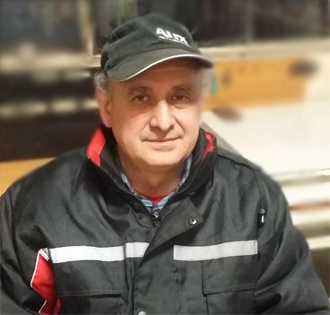Volunteering is a personal mission but also a valuable experience. Through it, one helps both the cause they have chosen to support and themselves by developing important skills – responsibility, teamwork, and communication skills. To promote the humanitarian work of volunteers around the world on an initiative of the United Nations, December 5 has been marked as International Volunteer Day since 1985.
Exactly one year after the UN first marked International Volunteer Day, on December 7, 1986, the town of Strazhitsa in northern Bulgaria was shaken by a earthquake of a magnitude of 5.7 on the Richter scale. Three people were killed and 80 were injured. Many were left homeless. One of the volunteers helping with the reconstruction work was Boyko Baev who had just graduated from the Technical University.
 "When a person helps another one, God is watching. And I believe that when I am in need, someone would also help me,” Boyko Baev says. Once a direct witness to many personal human tragedies, he has been moved by what is currently happening in Albania, which was hit by a powerful earthquake a week ago (6.4 on the Richter scale) and is currently dealing with grave consequences. The empathy and the thought about how you can help others immediately awakened in him. He knows that showing kindness at such a moment is extremely important because a person in need can't handle the situation alone. But he is also convinced that organization and management of donations is equally important so that help can reach the victims at the right time and in the correct form.
"When a person helps another one, God is watching. And I believe that when I am in need, someone would also help me,” Boyko Baev says. Once a direct witness to many personal human tragedies, he has been moved by what is currently happening in Albania, which was hit by a powerful earthquake a week ago (6.4 on the Richter scale) and is currently dealing with grave consequences. The empathy and the thought about how you can help others immediately awakened in him. He knows that showing kindness at such a moment is extremely important because a person in need can't handle the situation alone. But he is also convinced that organization and management of donations is equally important so that help can reach the victims at the right time and in the correct form.
"In a city affected by an earthquake, it is first of all a good idea to make checkpoints where every car is checked," Boyko Baev says, who has seen with his own eyes thefts from damaged homes or thefts of donations.
"The other important thing is to keep a record of the people affected by the earthquake, because when resources and aid are given, they need to be allocated properly, based on information gathered. A similar register should also be made for destroyed and damaged property. Thus, when a new house is built, several related families would be accommodated there so that the most affected can have a roof as quickly as possible. And in the next stages houses for individual families will already be built. "
Experience has shown that in case of earthquakes that the best way is all aid to be distributed by one organization with full and accurate accountability, operating under constant independent control and distributing donations according to the created registers.
"First, tents are not a good option. There is a need for containers suitable for living that are made available for temporary use and people should be required to return them in good condition. After clearing the area of devastation, new neighborhoods must be designed with the thought of making them resilient in the event of subsequent earthquakes – preferably single-family homes, prefabricated but with a guarantee of at least fifty years. This way in a short time, under decent conditions, the largest number of people will be able to have accommodation," Boyko Baev says.
He knows that man is powerless against natural disasters, but he has also seen how the power and courage to help bring much compassion and love with them.
English: Alexander Markov
Photo: Yordanka IvanovaThe 33rd Bulgarian polar expedition is heading to Antarctica to continue its scientific research in cooperation with scientists from different countries. For the first time, travelers from two Balkan countries - Greece and Montenegro, as well as from..
The program of the Orthodox Book Week offers meetings with authors, publishers and translators of Orthodox books from the last few years. The event is held until November 10 at the ''St. Procopius of Varna'' Church, with meetings taking place every..
The "Kabiyuk" horse breeding farm in the village of Konyovets is the oldest stud farm in Bulgaria, founded in 1864 by Midhat Pasha, the governor of the vilayet of Ruse, to produce horses for the Turkish army. The farm existed until the Russo-Turkish War..
An innovation for the treatment of diabetic foot ulcer using the patient's own tissue and artificial intelligence has been implemented at the University..
Over 3.5 million Ukrainians have arrived in or passed through Bulgaria since the beginning of the war. Nearly 200,000 people have found temporary..
At the Bulgarian Embassy in London, Prof. Bettany Hughes presented excerpts from the new BBC series - Wonders of Bulgaria. Prof. Bettany..

+359 2 9336 661
